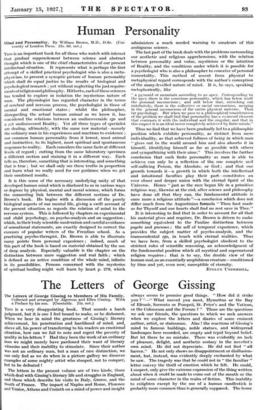Human Personality
Mind and Personality. By William Brown, M.D., D.Sc. (Uni- versity of London Press. 12s. lid. net.) Tins is an important book for all those who watch with interest that gradual rapprochement between science and abstract thought which is one of the chief characteristics of our present intellectual situation. It represents what is perhaps the first attempt of a skilled practical psychologist who is also a meta- physician, to present a synoptic picture of human personality which shall do equal justice to the results of biological and psychological research ; yet without neglecting the just require- ments of religion andphilosophy. Hitherto, each of these sciences has tended to explore in isolation the mysterious nature of man. The physiologist has regarded character in the terms of cerebral and nervous process, the psychologist in those of mental and emotional states ; whilst the philosopher, disregarding the actual human animal as we know it, has considered the relations between an undiscoverable ego and a yet undiscovered Reality. Yet all three types of specialist are dealing, ultimately, with the same raw material—namely the ordinary man in his experiences and reactions to existence ; our common human personality from it lowest, most animal and instinctive, to its highest, most spiritual and spontaneous responses to reality. Each considers the same facts at different levels of regard ; cutting from the same laboratory specimen a different section and staining it in a different way. Each tells us, therefore, something that is interesting, and something that is true ; but we shall only see these truths in proportion and learn what we really need for our guidance when we get their combined results.
It is this sense of the necessary underlying unity of that developed human mind which is disclosed to us in various ways or degrees by physical, mental and moral science, which forms the connecting link between the different sections of Dr. Brown's book. He begins with a discussion of the purely biological aspects of our mental life, giving a swift account of the present situation as regards the relation of mind to the nervous system. This is followed by chapters on experimental and child psychology, on psycho-analysis and on suggestion ; which, in their truly scientific moderation and careful avoidance of sensational statements, are exactly designed to correct the excesses of popular writers of the Freudian school. As a practising psycho-therapist, Dr. Brown is able to illustrate many points from personal experience ; indeed, much of this part of the book is based on material obtained by the use of deep analysis. Especially valuable is the chapter on the distinction between mere suggestion and real faith ; which is defined as an active condition of the whole mind, infinite in its possibilities. Persons concerned with the mysteries of spiritual healing might well learn by heart p. 279, which administers a much needed warning to amateurs of this ambiguous science.
The last part of the book deals with the problems surrounding our aesthetic and religious apprehensions, with the relation between personality and value, mysticism or the intuition of Reality, and the conditions under which it is possible for a psychologist who is also a philosopher to conceive of personal• immortality. This method of ascent from physical to metaphysical regard corresponds with the author's conception of the many-levelled nature of mind. It is, he says, speaking metaphorically, like
a pyramid or mountain ascending to an apex. Corresponding to the apex there is the conscious personality, which has below itself the personal unconscious ; and still below that, stretching out indefinitely, there is the collective or racial unconscious, merging in the general unconscious of the entire physical universe. Thus far psychology. But when we pass to a philosophical consideration of the problem we shall find that personality has .a universal element that contrasts it with the individual and the singular, and that in this respect it is an ideal never completely achieved by finite minds."
Thus we find that we have been gradually led to a philosophic position which exhibits perionality, as distinct from mere individuality, as that achieved fullness of being in which man " gives out to the world around him and also absorbs it in himself, identifying himself as far as possible with others and sympathizing with their aims." This involves the further conclusion that such finite personality as man is able to achieve can only be a reflection of the one complete and self-sufficing Person, the Absolute, or God ; and that our growth towards it—a growth in which both the intellectual and intuitional faculties play their part—constitutes au ever closer and deeper union with the eternal Spirit of the. Universe. Hence " just as the race began life in a primitive religious way, likewise at the end, after science and philosophy have done all that they can, the fundamental attitude is once more a religious attitude "—a conclusion which does not differ much from the Augustinian formula " Thou hast made us for Thyself and our hearts shall find no rest save in Thee."
It is interesting to find that in order to account for all that his material gives and requires, Dr. Brown is driven to make something equivalent to the Pauline distinction between psyche and pleuma ; the self of temporal experience, which provides the subject matter of psycho-analysis, and the transcendental ego, in touch with eternal realities. Thus we have here, from a skilled psychologist obedient to the strictest rules of scientific reasoning, an acknowledgment of the fundamental position which all mystical and supernatural religion requires : that is to say, the double view of the human soul, as an essentially amphibious creature—conditioned by time and yet, even now, susceptible of eternity.
EVELYN UNDERHILL.


































 Previous page
Previous page